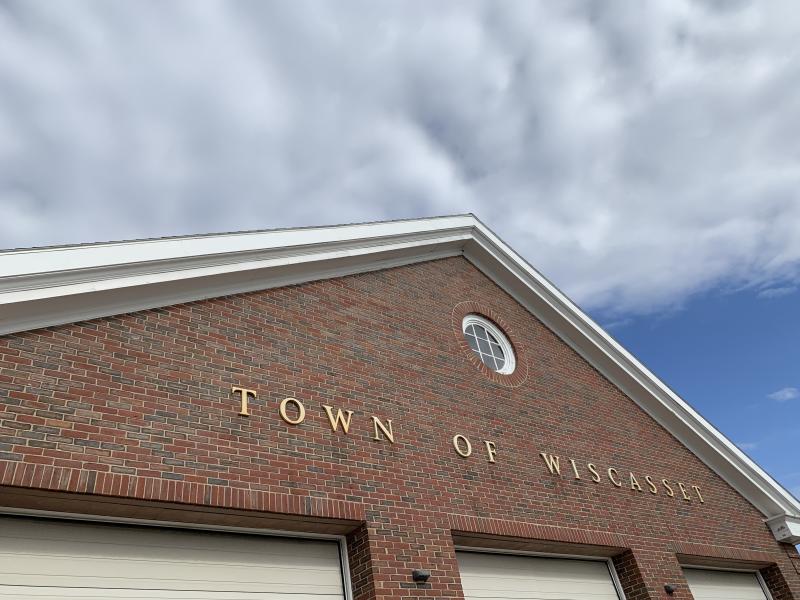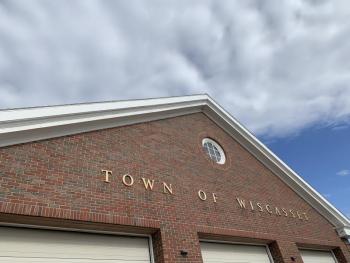Wiscasset selectmen Tuesday night, July 18 put off until Sept. 19 a decision on Amistad/commonspace’s request for a business license for Harbor Peer and Wellness Center at St. Philip’s Church on Hodge Street. Selectmen and Town Manager Dennis Simmons said the discussion – filled with concerns over trust and potential safety and property impacts, and support for the proposal as a benefit to the town and people in recovery – left them with more questions than answers.
The license application describes the proposed center as “a community resource and recovery center offering support groups and one-on-one coaching/mentoring, along with other community enrichment offerings.”
The vote to table the request until Sept. 19, contingent on the applicant submitting a more detailed plan, passed with Pam Dunning, motion maker William “Bill” Maloney and Chair Sarah Whitfield in favor and Terry Heller abstaining. Whitfield explained at the discussion’s outset, Heller was recusing herself due to her involvement with St. Philip’s.
Proposing the two-month tabling, Maloney said this would provide a cooling off period and that maybe Amistad will see about going somewhere else. The statement drew applause in the meeting at the town office and which was carried on Zoom and YouTube. The organization’s executive director Brian Townsend then said it appears there has been a “really effective campaign to block something.” Other communities have welcomed the programs, he added.
Maloney told Townsend, “You’ve got a lot of angry people out there in the audience. How can you assure them they’re not going to get up in the morning and find people sleeping on their lawn (or) their porch ... ?”
Townsend said no one under the influence is allowed to be at the center, “and very key to that, we support them getting to somewhere else, always.”
The center cannot do needle exchanges, Townsend said, citing an “extremely explicit” contract with Maine Department of Health and Human Services. The center must be program-focused, not “open-ended, drop in space”; and must be able to connect clients to other help, from community partners, he said.
Tanya Hammond grew up on Hodge Street and lives there now with her children. She said St. Philip’s Help Yourself Shelf and Feed Our Scholars benefit the community, but the church’s partnerships with Amistad “have me worried, very worried ... St. Philip’s desires to help those in need, and for financial assistance to maintain their facilities, are now coming at our community’s expense. They are inviting all the problems, safety risks and financial liabilities associated with homelessness and substance abuse into our village.”
She said “at the very least” the selectboard should place restrictions on the license and make clear how enforcement will be managed. She and other speakers asked the board to wait on deciding the license request.
If the center opens and the apartments go in upstairs at the church, Main Street’s Samantha Gauld plans to request her $6,000-plus a year in taxes be halved, to reflect the drop she expects in her property’s value; she encouraged other property owners in the village to do the same. “I think everyone here tonight would like to help those less fortunate. But charity begins at home, my home. I cannot help those in need if I suffer a catastrophic monetary loss. Please do not approve this proposal, as this venture will negatively and seriously impact the very fabric of our nationally significant historic village snd homes,” Gauld said.
Landlord Richard Forrest recalled being on a then-new local ambulance crew in the 1970s and in one home finding a man and woman on drugs, not following logic. “It was frightening.” He said he has a responsibility for his tenants to feel safe at home, and the selectboard has a responsibility for people to feel safe at home. “I urge you to do the right thing.”
Anna Ridle said having a local program can help people in recovery succeed, and help the economy. “Let’s put people to work. Let’s have people be there for their families.”
Supporting the proposal, Anne Dill said she worked half a century ago on the cutting edge of de-institutionalizing those will mental retardation. She heard town meetings then that sounded like that night’s discussion, she said. The fears were as real then as they are now, but these days there are support services to help people live vibrant lives, “well incorporated into the communities that at first feared their existence,” Dill said. “We may need to have clarity of language in order to have a satisfactory business license granted to commonspace. I believe that the service that they propose to provide to Lincoln County, the State of Maine and this town, will make the fact that it is the prettiest town in the State of Maine a reality on a scale the likes of which no one has considered.”
Priest in Charge Tom Junkert said St. Philip’s has been doing “the work of recovery” for decades, by hosting Alcoholics Anonymous meetings. “This has been a safe place, a haven, a refuge, a sanctuary. And I see that happening with this recovery center as well.” The church does want an advisory committee with Amistad and the community, he said. “If we have fallen down on that, we are sorry. But we do want to be engaged in that.” He asked the board to vote that night on the license request.
Also July 18, Sewer Department Superintendent Robert Lalli said in a hearing on a proposed 8.6% sewer rate hike, after last year’s hike to increase revenue by 46%, “I know it’s more pain and I know it’s more struggle ... but if we could meet that budget, it would be terrific.”
Mike Riley asked why generators the department got are on fuel oil instead of propane, which he said has has gone down in price and is more efficient. “Fuel oil, that’s in the past,” Riley said. Propane generators cost more and, in a prolonged power outage, the town has access to fuel oil and not to propane, Simmons said.
Plan call for selectmen to consider the rate hike Aug. 1.
The board authorized Simmons to work with Johnson Controls on a plan for a development agreement to consider on possible infrastructure upgrades to save on energy costs. Johnson Controls representatives said based on a very preliminary assessment, a $2 million or $2.5 million project would save Wiscasset $120,000 a year. They said the savings would fund the project over 20 years.
The board named Allen Cohen to the ordinance review committee; Heather Jones and Robert Nesbitt, budget committee; and Heather Jones, Peter Eaton and Mary Finn, comprehensive plan committee; and nodded business licenses for Down Yonder, LLC, a sandwich and salad shop, 100 Main St.; Hand-E-Man Sidework & More, 285 Birch Point Road; and Angelo Santo, a gallery and art studio, 64 Main St.























